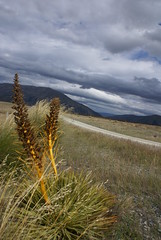As a small country we naturally argue no! Despite our size we make important contributions to the world, and we certainly do our best to play with the big boys but do we need to have a bit of a re-think about the way we manage our resources.
We’re not big, and that’s a fact we cannot change. So should we be working on getting more and more produce out of what we have, or is it perhaps smarter to be looking at increasing profit rather than produce – the two are not necessarily linked.
The way I see it, what we want is to grow economies (in the basin for instance). There are problems and limitations associated with increasing production that we wont always be able to deal with, and these need to be recognized and ‘worked around’.
Lets think about what it is we need from our resources, and what it is we want – and make a plan.
Increasing production in the Mackenzie is and isn’t a good idea, but which of those it is depends on who you are and what you do.It’s just not as black and white as all that, and the answer is probably somewhere in the middle.
Increased produce from the same amount of land means intensification. Intensification usually involves the application of fertilizers, increased management and better access to water. In the Mackenzie this sort of treatment can be simplified to the creation of a less extreme environment where the less resilient pasture grasses and crops do better, and while this is bad news for the natives that have evolved over hundreds of years to dominate the desert that is the Mackenzie it is arguably only applicable to areas already managed and not of significant native biological value.
Increased management (as far as technology and man power) is an acceptable cost to land managers when overall profits are increased with the increase in production and may even be reduced in the long-term as pastures become homogenized.
 Concerns arise over any additional application of fertilizers, herbicides and pesticides, but it seems that problems arise in individual cases and must be dealt with as such.
Concerns arise over any additional application of fertilizers, herbicides and pesticides, but it seems that problems arise in individual cases and must be dealt with as such.
The biggest problem associated with intensification comes down to water. Surface water is already intensely managed in the Upper Waitaki catchment, as anyone who has visited the area will know.
Problems around water are varied, some of which I’ve discussed before, particularly long-term effects on ground water and the health of the remaining braided rivers but I really wanted to say something about economics.
And economics are not my strong suit so please excuse the meandering.
Are we arguing a moot point, if there isn’t enough water to irrigate in the way that is detrimental to the landscape values of the basin (as power production schemes seem to have tight controls on much of the surface water in the basin anyway), and if management of irrigation is such that it isn’t affecting the long-term health of ground and surface water (which, with the help of good farm managers and technological advances, seems within our grasp) then whats the problem?
Economically we should look at water as something that will give some farmers (not all) access to relatively small quantities in order to giver them more surety, allowing better planning and consistency in production = better long-term planning and opportunity for investment.
And in the end
Perhaps the question should be: Are we banging our heads against a wall increasing land use and intensification of already managed land – and potentially screwing ourselves (the long-term health of the environment and therefore our ability to use the services it provides) in the long-term to do it?
Lets think smarter. New Zealand is already known for doing odd things well, this is an idea we can grow – and grow economies from!
Think quality over quantity, find a niche and fill it well. Can we realistically compete with places like the US in terms of quantity?



